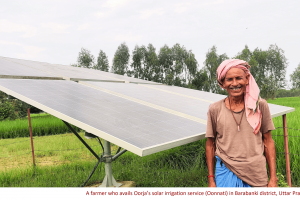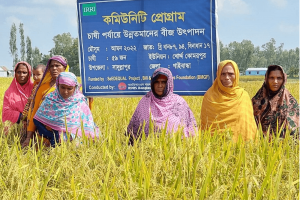
The Meos who reside in Nuh district of Haryana and parts of Alwar in Rajasthan are imprisoned in a vicious cycle of poverty owing to their ethnicity, location, and ignorance. In this note, Ms Aparna Radhakrishnan and Ms Niti Saxena reflect on their experiences while implementing the Krishi Jyoti Project in this region.
CONTEXT
Despite being located about 80 kilometers from the capital of India, and despite being part of one of the wealthiest states of India– Haryana –Nuh[1] rank very low on key development indices. Inhabited by a unique ethnic group, the Meo-Muslims, the region has been administratively neglected for years and it continues to be deprived of basic facilities. The literacy, income and occupational status of the Meos prove beyond a doubt that they are the most marginalized group in Haryana, according to a baseline study conducted by global advocacy group Save the Children (The Hindu, 2001). Educational statistics reveal that merely 37.6% of females are literate as against 73% literacy rate among males (Census, 2011). Agriculture continues to be the major livelihood option despite the fact that the region is marked by very harsh climatic conditions, and agriculture continues to be a non-remunerative occupation.

The reason for underdevelopment of the region primarily lies in its acute water scarcity, and whatever groundwater is available is highly saline, almost on par with sea water (Sharma et al., 2012). Increasing family size with every generation, coupled with cultural traditions involving marriage and inheritance, has led to ever smaller landholdings and decreasing agricultural profits. Agriculture being a seasonal activity, seasonal unemployment is high in the region. Despite such adversities, most of the population continues to be involved in agriculture because the region has not attained much development and industrialization, and therefore fails to offer alternate livelihood opportunities. Out-migration is low as education and skill levels are deficient. With limited availability of resources for agriculture for an ever-growing population, the only alternative to attain food security is to increase productivity.
In this backdrop, the SM Sehgal Foundation (Sehgal Foundation), a public, charitable trust registered in India since 1999 started work to achieve positive social, economic and environmental change across rural India. Since then, the foundation has been working in Nuh district of Haryana, and has in recent years expanded its work to Rajasthan, Bihar, Telangana, Karnataka and Andhra Pradesh. With the realization that human rights are central to developing every person’s potential, the foundation has laid emphasis on gender equality and women’s empowerment. The foundation’s team works, together with rural communities, in the areas of water resources, agricultural productivity and rural governance, and addresses three crucial issues: water security, food security and social justice. Apart from this, the foundation also engages in participatory research, impact assessment, interactive dialogue and community media in order to take informed actions and achieve sustainable results.
The agricultural intervention programme of the Sehgal Foundation focuses mainly on building capacities of the farming community by disseminating agricultural technologies and timely information to Panchayat members and other interest groups, through workshops, trainings and exposure visits. This article deals with the good practices that constitute the agriculture intervention program of the foundation named ‘Krishi Jyoti’. Box 1 provides an outline of the ‘Krishi Jyoti’ project.

GOOD PRACTICES
Ever since its inception, Krishi Jyoti has expanded to 21 villages and has directly benefited approximately 1289 farm families. The package of good practices generated by this project encompasses the following:
Soil Testing: Soil samples from project villages are sent to an accredited soil testing laboratory for analysis. This soil analysis helps in designing the package of practices after assessing levels of micronutrients in the soil. The farmers see significant increases in crop yields, and they come to realize that with every crop there is large depletion in the amount of nutrients in the soil and these must be replenished to sustain the production of a healthy crop.
Farmers’ Trainings: An important aspect of the program is the initial training imparted to beneficiary farmers. During the training sessions, farmers are given information about the role, quantity, and timely application of each of the macro and micro soil nutrients, irrigation requirements, and they are also advised on pest attacks. The community is motivated to adopt changes in agricultural practices through individual contacts, farmer meetings, trainings, expert visits, and readily-available advice. On- and off-farm trainings are imparted to the participating farmers on new agricultural techniques for the following crops: millet, mustard, wheat, cotton and vegetables. Around 2000 farmers are getting trained each year under the Krishi Jyoti Project.
Farmers’ Meetings: Farmers’ meetings educate and motivate farmers to participate actively in project activities. A door-to-door survey is also conducted in the new villages to gather information about landholding. Justin 2017, 38 farmers’ meetings were conducted wherein 1382 farmers participated.

Farmer meetings organised under Krishi Jyoti Project
Field Days: To sensitize and increase adoption of the package of practices, Field Days are also organized. Field Days provide farmers an opportunity to observe differences in crops between a demonstration plot and a control plot. These are meant for disseminating information on the scientific package of practices. In 2017, 45 Field Days were conducted in which 1791 farmers participated.

Field Day event organized on demo plot
Package of Practice (PoP) demonstrations: Krishi Jyoti demonstrations use one-acre sections from local farmers’ fields. Seeds of high-yielding varieties/hybrids are sown in the entire one-acre plot. Half the plot is cultivated using the complete suite of practices formulated by experts from Krishi Jyoti, while the other half is cultivated with traditional practices. This helps farmers to directly compare results between modern and traditional farming practices, i.e., with and without soil nutrients. Around 2448 demonstrations were conducted for Kharif and Rabi crops (pearl millet, cotton, onion, mustard and wheat) in the year 2016-17.
Promoting water conservation measures:

a.Water augmentation: Improving the groundwater table through construction of check dams.
b.Water conservation: Encouraging farmers on the use of micro-irrigation through sprinklers and drip irrigation, and laser levelling.

Formation of VDCs: For maintaining sustainability of structures built under the project, like check dams, Sehgal Foundation forms Village Development Committees (VDCs) which put villagers into leadership roles that make them responsible for the operation and maintenance of these structures. Community contribution is collected to create a feeling of ownership among beneficiary communities. These contributions are channelized into maintenance funds managed by VDC members. This ensures long term sustainability of the physical infrastructure.
Kisan Sammelan: For the purpose of promoting regional interests of the local farmers of Nuh, Sehgal Foundation conducts annual Kisan Sammelans under the project. The purpose of a Kisan Sammelan is to create awareness among farmers about new technologies, and to check if the program interventions are being sustained in the beneficiary villages in all aspects – agriculture, check dams and schools. They also provide an opportunity for the sponsors to redirect their research as per need, so that the ultimate end user gets benefitted. Participating farmers also obtain insights on project interventions. The progressive farmers are given a certificate acknowledging their participation in the project and are given an opportunity to share their stories that serve as a motivation for other farmers who get to know more about newer farming methods (see Box 2).

Facilitation of champion farmers: Participating farmers are motivated by felicitating ‘champion farmers’ of villages who have been labelled as the most progressive farmers in the region. The award, consisting of manually-operated sprayers and ‘Certificates of Recognition’, are aimed at inspiring farmers to adopt modern agricultural practices so as to improve farm income. Other stakeholders, especially farmers and teachers who play lead roles in check dam construction, school renovation projects and community mobilization, are also felicitated. The sammelan is also used as a platform to felicitate those members of the community who are instrumental in mobilising villagers for building the check dam.



PROJECT IMPACT
Third party impact assessment carried out by Think Through Consulting Private Limited, has revealed that the overall rates of adoption of micronutrients for pearl millet, mustard, and wheat has increased and is being sustained even two years after project completion. For onion and cotton, adoption rates were 100 percent and all the farmers covered during the survey were using potassium-magnesium and zinc with urea and DAP. The assessment showed improved productivity for those farmers who adopted Krishi Jyoti practices as compared to those who hadn’t. A comparison with control villages during the assessment survey showed a significant difference in productivity levels. Further improvement in productivity is predicted with greater focus on improved water management practices.

END NOTE: Reaching the last mile
Krishi Jyoti serves as a major source of motivation for boostingthe participation of farmers who learn from fellow farmers and from the scientists in the project through adoption of practices recommended by the project, which helps to make farming rewarding. Farmers who have adopted advanced agricultural practices keep looking for additional information and new technologies all the time. This is where the importance of mass contact methods, such as Kisan Sammelan and other good practices, come in under Krishi Jyoti. Small farmers, especially illiterates and women, find it difficult to access information on various aspects of agricultural development, and such groups are also hesitant to accept any advice given by experts as they have experienced failure in the past. Evaluation of a program through beneficiary feedback is a very common practice, but learning components incorporated with feedback as practiced in this project give interactions multi-level credibility.
References
The Hindu. (2011.) Discrimination responsible for low level of education among Meo. Retrieved from http://www.thehindu.com/todays-paper/tp-national/discrimination-responsible-for-low-level-of-education-among-meos/article2041232.ece.
Census. (2011.) Haryana Population Census Data. Retrieved from http://www.census2011.co.in/census/state/haryana.html.
Sharma, L. M. Sathyavada, A. and Chowdary, A. (2012.) Water quality and human health in Mewat: Challenges and innovative solutions. Chapter in: Interlacing Water and human health: Case studies from South Asia. (Pp. 200-229). New Delhi
Aparna Radhakrishnan (a.radhakrishnan@smsfoundation.org) is a Senior Research and Policy Associate withthe Development Research and Policy Initiatives Division, SM Sehgal Foundation. Niti Saxena (niti.saxena@smsfoundation.org) works as Director, Development Research and Policy Initiatives Division, SM Sehgal Foundation. The authors gratefully acknowledge the inputs given by Arvind Rana, Program Leader, Agricultural Development, SM Sehgal Foundation.





Add Comment